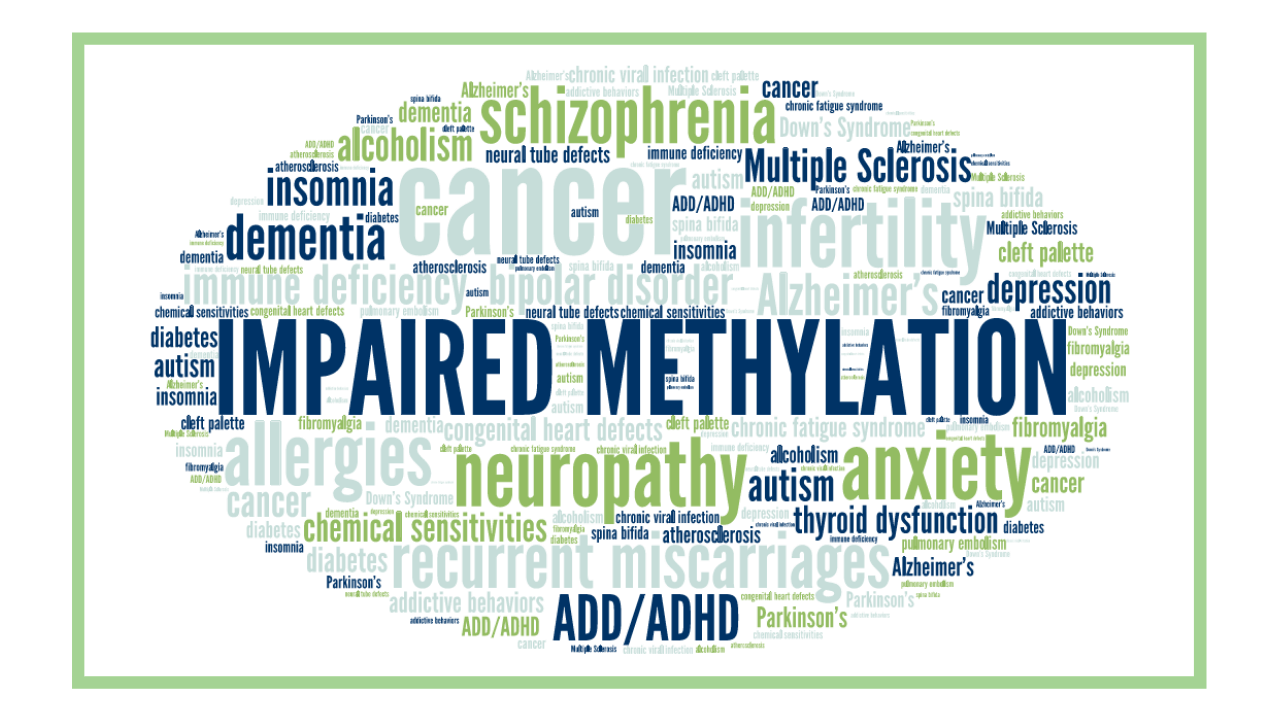Genetics and methylation – an introduction

You are the product of your genetics — if only it was so simple.
Every aspect of who you are, from the inside out and top to bottom, depends on your body’s ability to efficiently and correctly express your particular genetic makeup in the face of external factors. In many cases, even if you have genetic variations that lend a predisposition to illness, your choices may help limit, possibly reverse, negative genetic expressions through optimizing your diet and lifestyle.
We live in a fast-paced world filled with all kinds of products that, while they may help make our lives more efficient or pleasurable, may actually harm us in the long run. When you multiply certain genetic factors with lifestyle exposures, both acute and chronic illnesses may occur. Even those with optimal health and genetic expression may face health challenges due to external factors or poor personal choices. For example, genetically modified food, toxic chemicals, a leaky intestinal barrier (“leaky gut”), and synthetically made medicines and supplements burden both body and brain resulting in impaired methylation, eventually leading to chronic illness.
Dr. Rosario’s Story
Dr. Rosario, the founder of Teach them Well, suffered from chronic illness in the form of severe autoimmune thyroid disease for more than 25 years. She was first diagnosed with thyroid disease at the young age of 8 — for perspective, the average person receives a diagnosis between the ages of 30 and 50. Growing up, Dr. Rosario suffered from fatigue, mental fog, chemical and metal sensitivities, and more. She had difficulties recovering from basic procedures such as dilation at the optometrist’s office or lidocaine from dental visits. She also developed food allergies and had difficulty maintaining a healthy weight despite diet and exercise. Conventional medicine told her that she was doing everything right, yet everything felt wrong.
Through the studies of human biology and chiropractic medicine, Dr. Rosario realized that there must be a genetic factor. She was diagnosed at a very young age and many of her adult family members also suffered from thyroid disorders. Dr. Rosario took advantage of her knowledge-base to jump into the fields of nutrigenomics, functional neurology, and functional medicine. Through the integration of these fields, Dr. Rosario found one of the keys to her chronic illness in methylation.
Why functional medicine?
Poor methylation presents itself as patterns of illness. To the untrained eye, these patterns may appear to be distinct symptoms affecting individual body systems. Conventional medicine breaks down these symptoms and systems into discrete specialties, often resulting in a disjointed picture of the overall illness. Such a fractured approach is much like trying to put together a puzzle when several pieces are missing. By integrating functional neurology, neuroendocrine immunology, and nutrigenomics, functional medicine completes the puzzle and the patterns of illness suddenly become visible.
What is methylation?
In short, methylation is the process by which different genes in your DNA are turned on or off. It is a process occurring at every millisecond of your life. When methylation occurs improperly your body begins to show symptoms, usually through the development of one or more chronic illnesses.
Methylation allows your genes to switch on and off when a methyl group, one carbon atom bonded to three hydrogen atoms, attaches to a molecule along a strand of DNA. Methylation is responsible for numerous processes within the body, not the least of which are:
- Regulating gene expression
- Processing the body’s use and detoxification of chemicals and metals
- Building neurotransmitters for the nervous system
- Processing hormones throughout the endocrine system
- Building infection-fighting cells in the immune system
- Synthesizing DNA and RNA to create new, healthy cells
- Producing energy to keep the body going
- Producing myelin to protect nerves and nerve function
What happens when methylation is impaired?
When methylation is impaired, any number of illnesses may occur, some more obvious than others. Included in these illnesses are those that present as physical symptoms and disease as well as neurologic and psychiatric illnesses. Methylation is important for every process within your body and thus may support or inhibit every aspect of your wellbeing.
What causes impaired methylation?
Although methylation occurs deep within your genetic material, it is also impacted by numerous external factors from the foods you eat to the medications you take and materials in your environment. How well you sleep, handle stress, and whether or not you exercise may also affect your body’s methylation cycle. Genetic mutations within the cycle may further hinder methylation. Thankfully, depending on your particular genetic makeup, you may be able to take steps to improve methylation and thus your overall health.
You can shift your methylation cycle
Just as many environmental and external factors may harm your methylation cycle, there are factors that may tip the balance in your favor. Once certain genetic markers are identified, it may be possible to change your diet and habits to support your body’s methylation cycle. Because your genetic makeup is unique to you, treatment of impaired methylation must also be individualized to meet your particular needs. In fact, genetic-based nutrition is the future of nutrition and food-based medicine.
Get tested and learn more
The best way to find out if impaired methylation is the root cause of your chronic illness is to undergo genetic testing and have your results analyzed, along with your diet and other factors, by a professional. While testing alone may provide you with answers to questions about your health and wellbeing, teasing out the proper therapies, whether dietary or otherwise, may be complex. Simply striking out on your own with a particular diet, exercise regimen or therapies may actually result in a worsening of symptoms. Having the support and knowledge of a specialist is key.

